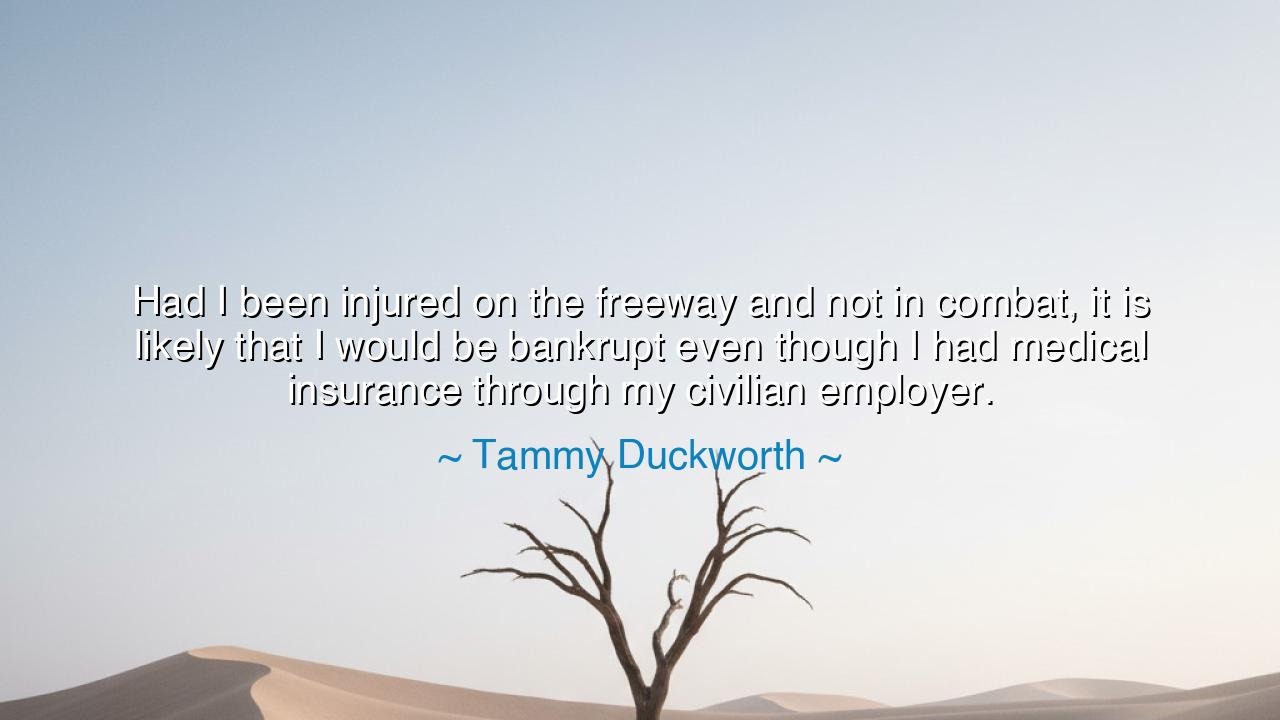
Had I been injured on the freeway and not in combat, it is likely
Had I been injured on the freeway and not in combat, it is likely that I would be bankrupt even though I had medical insurance through my civilian employer.






Hear the words of Tammy Duckworth, warrior, survivor, and servant of the people: “Had I been injured on the freeway and not in combat, it is likely that I would be bankrupt even though I had medical insurance through my civilian employer.” In this testimony lies both a personal truth and a national indictment. She names the reality that injury and illness, though universal to all humans, are not treated equally in the systems we have built. The soldier, wounded in war, is sustained by the promises of a grateful nation, but the civilian, broken in an accident, may be left to ruin even if insured.
The origin of this saying comes from Duckworth’s own life. As a U.S. Army pilot in Iraq, she was grievously wounded when her helicopter was struck by enemy fire. She lost both legs and nearly her life. Yet because she was injured in combat, the nation bore her care; she was covered, protected, and supported through the Veterans Administration. But in this reflection, she reminds us of the cruel paradox: had the same wounds come from a car crash on an American freeway, her fate might have been financial devastation. Even with medical insurance, the labyrinth of deductibles, limits, and uncovered costs would likely have driven her into bankruptcy.
This truth reveals a deeper wound, not of body but of society. For what does it mean that a nation provides fully for its warriors in the field, but allows its citizens at home to fall through the cracks of its medical system? The ancients would have called this a fracture in justice, a failure of balance. In Rome, veterans were rewarded with land and pensions, but civilians too were protected by communal systems of grain and aid. The duty of a people was not only to honor the soldier but to safeguard the citizen. Duckworth’s words ring with the echo of that ancient duty, still unmet.
Consider the story of a man named Nicholas, a steelworker in the American Midwest, who decades ago was crushed in a workplace accident. Though he lived, the medical bills consumed his savings and his home. His family descended into poverty, not for lack of work, not for lack of courage, but because the system demanded wealth in exchange for healing. His story, like thousands of others, shows the tragedy Duckworth names: the battlefield of ordinary life can be as dangerous to livelihood as the battlefield of war, yet it is too often ignored.
The meaning of Duckworth’s words is not to diminish the care rightly given to veterans, but to expand its principle. If a nation can marshal the resources to save and sustain those injured in combat, then surely it can do the same for those struck by illness or accident at home. Healing should not depend on the origin of the wound. The value of a life is not greater in war than in peace. To make such distinctions is to betray the unity of the people, whose common strength depends on all being cared for in their time of need.
The lesson is clear: we must demand systems that protect all citizens from the ruin of medical costs, not only some. Insurance should be a shield, not a sieve through which the vulnerable slip. Just as soldiers rely on the certainty that they will not be abandoned if injured in service, so too must civilians trust that they will not be abandoned when tragedy strikes. For only then can a society claim to honor life equally, whether on the freeway or in combat.
Practical action follows from this wisdom. Advocate for reforms that ensure comprehensive medical coverage, not riddled with holes but firm and just. Support leaders who speak for the uninsured and underinsured. In daily life, extend compassion to those crushed not only by injury but by the weight of debt that follows it. Teach children that justice means caring for all, not only the heroic, for every life carries dignity.
Thus Duckworth’s words endure as both warning and hope. They remind us that fortune is fragile—that the difference between health and ruin may be as simple as where one’s injury occurs. Let us, then, build a society where no citizen fears bankruptcy when seeking healing, where the right to care is as universal as the need for breath. For in such a society, the warrior and the worker, the soldier and the civilian, stand equal before the promise of life preserved. This is the teaching she offers, and this is the charge we must carry forward.






AAdministratorAdministrator
Welcome, honored guests. Please leave a comment, we will respond soon